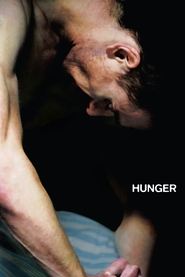McQueen's visual and aesthetic strategy now seems to anticipate Jonathan Glazer's work in Under the Skin (2013) and The Zone of Interest (2023) especially. Pretty stunning that this was McQueen's theatrical debut.
The prologue can also be read for its spatial conception: the outside world seen as a carceral antechamber, with imprisonment as a metaphor for occupation. [And whilst the closing] visuals are poetic and transcendent, no doubt, but they also represent the most definitive kind of “jailbreak” imaginable in what is, after all, a prison movie.
— Chris Darke (Criterion)
The [Sands—Priest] conversation begins as a rat-a-tat-tat Mamet-like banter of verbal one-upmanship between the two men, but the exchange is divided within the frame [at] the moment Sands reveals the details of a childhood moment that underlines his philosophy—a moment that fleetingly seems to emotionally unite the two men yet actually isolates them through the extremity of belief.
— Travis Crawford (Slant Magazine)
McQueen frames Brian Milligan’s sleepy-eyed inmate Davey Gillen in still close-up, his sudden resemblance to storybook Jesus startling but unmistakable. […] Like Bresson with Pickpocket, McQueen is interested in using Hunger to silently document the daily intricacies of committing a crime—in this case running a revolution from a prison cell.
— Lauren Wissot (Slant Magazine)
In her book, The Body in Pain (1985)—a remarkably unique avenue into some fundamental issues in phenomenological philosophy and political theory—Elaine Scarry examines [the] impossibility of language for the sentient body subjected to torture. This rendering of a human to a non-linguistic state is for the person upon whom the violence is inflicted what Scarry terms “the unmaking of the world.” The lack of dialogue in Hunger profoundly enters into a violent struggle that has literally reached the point of being past words. The unmaking of the world resulting from the war going on even turns back on itself in the self-inflicted torture and death of the hunger strike.In this circumstance of bare-knuckle brutality and monkish communicative abstinence, when the time finally comes for language in the film, it’s as if that occasion is the only possible opportunity to talk; as it would have been, in fact. I have in mind—of course—the long dialogue scene between Sands and the preacher who is trying to talk him out of his fast. Everything counts, even the so-called small talk. Clausewitz said war is a mere continuation of politics by other means. Here we have the continuation of war by other means. The semantic substance of it—Jesus!—it’s literally a life and death conversation.
Taken out of context as a scene in its own right, that dialogue is the kind that is never supposed to be in cinema. It belongs on the stage. The director knows this full well and shoots it accordingly. He almost entirely dismantles the three-dimensionality of the space by way of silhouette and bodily stasis in order to make the opposing profiles confront each other to speak in no uncertain terms. When he finally cuts in to close-up, the intimacy is almost unbearably intense. The tension and pacing of it is approaching the aesthetic status of music.
[…]
While plainly adopting the point of view of the former party, the humanist consideration it gives to the latter is what elevates Hunger beyond a doctrinaire tract. There is a neutrality to the film at a higher level of abstraction, philosophic if you will, whereas the bias is politically concrete.
— Ben Livant (Slant Magazine)
The long stretches of silence prepare us for the big verbal blow-out by making us hunger for the spoken word. We are so starved for some sort of linguistic engagement, we can’t wait to hear these two sit down to hash things out.
— Ben Livant (Slant Magazine)
Watching Hunger for the second time, I see it secondarily as a puzzle or intellectual challenge, designed to confront the issue of whether information is actually helpful, and how much or how little of it we need to understand historical events.
— Andrew O'Hehir (Salon)

